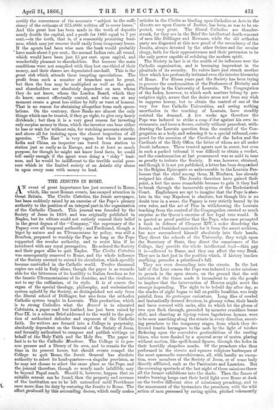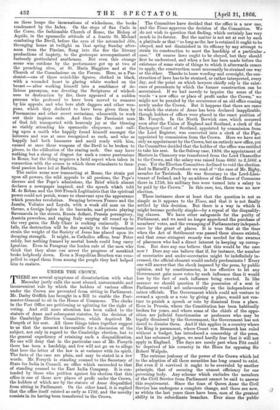Tab JESUITS IN ROME.
AN event of great importance has just occurred in -Rome, which, like most Roman events, has escaped attention in Great Britain. The Civilta Cattolica, the Jesuit newspaper, has been suddenly raised by an exercise of the Pope's plenary authority to the position of an integral part in the organization of the Catholic Church. This journal was founded by the Society of Jesus in 1850, and was originally published in Naples, but its editors could not entirely conceal their belief in the_great dogma of the " Company," the supremacy of the Papacy over all temporal authority ; and Ferdinand, though a bigot by nature and an Cltramontane by policy, was still a Bourbon, prepared to worship the Pope as long as the Pope supported the secular authority, and to resist him if he interfered with any royal prerogative. He ordered the Society and their .paper alike to quit Naples. The Civilta Cattolica was consequently removed to Rome, and the whole influence of the Society exerted to extend its circulation, which speedily became unrivalled in the Catholic world. Twelve thousand copies are sold in Italy alone, though the paper is as remark- able for the bitterness of its hostility to Italian freedom as for the fanatic 'Ultramontanisni of its doctrine, and the virulence, not to say the ruffianism, of its style. It is of course the organ of the special theology, philosophy, and ecclesiastical system upheld by the Society, as distinguished not only from the liberal school of Malinger, but also from the orthodox Cathdlic system taught in Louvain. This production, which is to strong Catholics what the Record is to educated Calvinists, a paper read but loathed, has just been raised by Pius IX. in a solemn Brief addressed .to the world to the posi- tion of authorized defender and exponent of the Catholic faith. Its writers are formed into a College in perpetuity, absolutely dependent on the General of the Society of Jesus, and formally authorized to compose and publish writings on behalf of .'the-Holy Faith and the Holy -See. The paper in fact is to be the Catholic 'Won/tear. The College is to -pos- sess presses and a library of its -own, and to remain for the time. in its _present house, but . should events compel the C011ege to quit -Rome, the Jesuit General has absolute authority to select its lead-quarters--a singular provision, as he may not choose to select the same place as the Pope, and the:journal therefore, though so -nearly made infallible, may be beyond Papal reach. Should it, however, happen that no suitable retreat can be :found, then the property and revenue of the 'Institution are to be left untouched until Providence once more -does its dutyhy restoring the Jesuits to Rome. The effect:produced.by this astounding decree, which really makes articles in the Civilta as binding upon Catholics as Acts in the Gazette are upon Courts of Justice, has been, as was to be ex- pected, very great. The liberal Catholics are thunder- struck, for they see in the Brief the intellectual death-warrant of men like Malinger and Newman, while the old orthodox disgusted atthisbyntche other new poroofer Orders eersascendancyd i thes secular party are dalwiasys detested a clergy, both for their oppressiveness and their pretension to the only power capable of subduing the modern spirit. nar be The Society in fact is at the zenith of its influence over the Catholic organization, and is becoming imprudent in the plenitude of its security. Its rulers have just struck another blow which has profoundly irritated even the interior hierarchy of Rome. For fifteen years past the Society has been trying to procure the condemnation of the Professors of Divinity and Philosophy in the University of Louvain. The Congregation of the Index, however, to which such matters belong by pre- scriptive right, aware that the desire arose not from any wish to suppress heresy, but to obtain the control of one of the very few free Catholic Universities, and seeing nothing unorthodox in the teaching of Louvain, have steadily resisted the demand. A few weeks ago therefore the Pope was induced to strike a coup d'ertat against his own in- struments, and issue a decree, entirely without precedent, with- drawing the Louvain question from the control of the Con- gregation as a body, and referring it to a epecial tribunal, com- posed for the occasion of the Cardinals of the Index and the Cardinals of the Holy Office, the latter of whom are all under Jesuit influence. These trusted agents met in secret, but even in such a packed tribunal it was difficult to obtain a verdict, and the condemnation at last pronounced was so mild in tone as greatly to irritate the Society. It was, however, obtained, and though it is not yet published, a letter has been despatched to the Belgian Episcopate so unfavourable to the Louvain Pro- fessors that the chief among them, M. lloubacx, has already resigned his chair. The Jesuits therefore have gained their point, a feet the more remarkable because to gain it they had to break through the immovable system of the Ecclesiastical Court. Englishmen are apt to imagine that the Pope is abso- lute in the way Napoleon is absolute, but though this is no doubt true in a sense, the Papacy is very strictly bound by its own rules, and the act of Pius in withdrawing the Louvain teaching from the control of the Congregation created, as much surprise as the Queen's exercise of her legal veto would. It is quoted as proof positive that the Pope, who once prompted a book in defence of Clement XIV.'s order dissolving the Jesuits, and furnished-materials for it from the secret archives, has now surrendered himself absolutely into their 'hands. They direct the schools of the University, they weigh upon the Secretary of State, they direct the consciences of the College, they provide the whole intellectual food—thin pap it is—allowed to Rome, and they can affect the very Bank. They are in fact just in the position which, if history teaches anything, precedes a priesthood's fall.
They are even descending into the streets. In the last half of the Lent season the Pope was induced to order missions to preach in the open streets, on the ground that the evil infection of the times made it incumbent to stir the people to implore that the intervention of Heaven might avert the scourge impending. The sight to be beheld day after day, as the shades of night began to fall on public localities, was truly painful, from its grotesque caricature. 'Long files of cowled and fantastically dressed devotees, in gloomy robes, their heads and faces covered with sacks, slits in which let the gleam of two eyes flash through, ,preceded by monster crucifixes borne aloft, and chanting at tip-top voices lugubrious hymns, were to be seen marching along the streets in every direction, escort- ing preachers to the temporary stages, from which they de- livered frantic harangues to the mob by the light of torches flickering upon the convulsive gesticulations of the ranting friars, who were flanked by a spectral array of mutes, glaring without motion, like spell-bound figures, through the holes in their horridly shapeless masks. Of the preachers who thus performed in the streets and squares religious burlesques of the most spasmodic convulsiveness, all, with hardly an excep- tion, were members of the Society of Jesus, or of some body directly affiliated, such as the Passionists and 'Lazariste. But the crowning spectacle of the last night of these missions-threw all the former exhibitions into the shade. Then the flames of twelve burning heaps cast their lurid light over Rome at dusk on the twelve different sites of missionary preaehing, and to the amazement of the bystanders the preachers, with the wild action of men possessed by raving spirits, pitched vehemently. on these heaps the incarnations of wickedness, the books condemned by the Index. On the steps of San Carlo in the Corso, the fashionable Church of Rome, the Bishop of Aquile, in the spasmodic attitude of a frantic St. Michael combating the Devil, before the eyes of the astounded elite, thronging home at twilight on that spring Sunday after- noon from the Pincian, flung into the fire the literary productions of impiety, to the grotesque accompaniment of furiously gesticulated anathemas. But even this strange scene was outdone by the performance got up at two of the preaching sites, at St. Maria Maggiore and at the Church of the Consolazione on the Forum. Here, as a Pas- sionist—one of those weird-like figures, clothed in black, with a wounded heart in glaring white worked on the breast — after working himself into a semblance of de- lirious paroxysm, was devoting the Scriptures of wicked- ness to destruction by fire, there appeared of a sudden persons who professed to have been moved to remorse by his appeals, and who bore aloft daggers and other wea- pons, which they declared to have been given them by Freemasons and other secret sectarians, wherewith to work out their impious ends. And then the Passionist man of God felt transported with heavenly joy at the blessing so visibly attending his spasmodic eloquence, and call- ing upon a smith who happily found himself amongst the loiterers and was at once recognized as such, and who as happily had both hammers and anvil ready with him, caused at once these weapons of the Devil to be broken to pieces, to the edification of the staring mob. One may have nothing but a shrug of disgust for such a coarse pantomime in Rome, but the thing acquires a lurid aspect when taken in connection with the scenes to which these stimulants to fana- tical passion have led at Barletta.
The entire scene now transacting at Rome, the strain put upon all powers, the wild appeals to all passions, the Pope's decrees and the Pope's admissions, the Brief which almost declares a newspaper inspired, and the speech which told M. de /khan and the 300 French Legitimists that the spiritual power could not perish, wears to observant eyes the appearance which precedes revolution. Swaying between France and the Jesuits, Voltaire and Loyola, with a weak old man on the throne, a foreign legion in the barracks, mad priests playing Savonarola in the streets, Russia defiant, Prussia peremptory, Austria powerless, and raging Italy surging all round up to the very gates, the Holy Chair is rocking ominously. If it falls, the destruction will be due mainly to the tremendous strain the weight of the Society of Jesus has placed upon its decaying strength. It might, as Catholics affirm, bear Peter safely, but nothing framed by mortal hands could long carry Ignatius. Even in Paraguay the leaden rule of the men who think that they alone can arrest the progress of mankind broke helplessly down. Even a Neapolitan Bourbon was com- pelled to expel them from among the people they had helped him to enslave.































 Previous page
Previous page